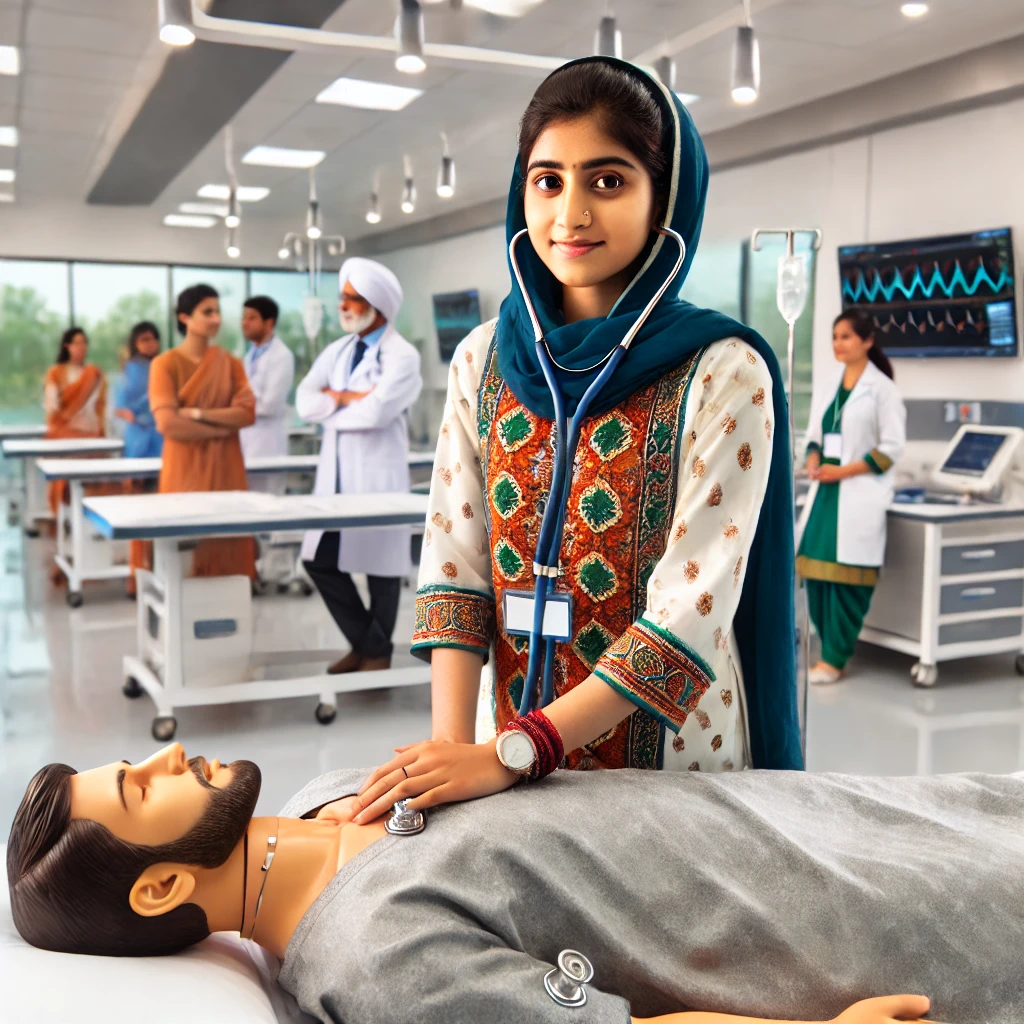Nursing in India has grown from being a vocation to becoming one of the most sought-after professions. With expanding healthcare infrastructure and opportunities abroad, more Indian students are opting for nursing as a career path.
Thank you for reading this post, don't forget to subscribe!

But how do you find the right nursing program in such a vast and diverse education system? This article explores options tailored to the Indian context and helps you make the best choice.
Types of Nursing Programs in India
The nursing landscape in India offers multiple pathways depending on your qualifications and career aspirations.
Auxiliary Nurse Midwife (ANM)
- Duration: 2 years
- Focus: Basic nursing care, maternal, and child health.
- Ideal For: Those looking for a quicker entry into healthcare.
General Nursing and Midwifery (GNM)
- Duration: 3 years
- Focus: Foundational nursing concepts and clinical skills.
- Popular for: Entry into hospital and community health settings.
Bachelor of Science (B.Sc.) Nursing
- Duration: 4 years
- Focus: Advanced theoretical and practical training.
- Benefits: Prepares students for leadership roles or higher education.
Specialized Nursing Programs
Post Basic B.Sc. Nursing
Designed for GNM graduates, this program offers a bridge to higher education in nursing.
M.Sc. Nursing
This is a postgraduate program focusing on specialized nursing fields like pediatrics, obstetrics, or mental health.
Diploma and Certificate Courses
Short-term programs for skill enhancement, such as Critical Care Nursing or Emergency Nursing.
Accreditation in India
Accreditation ensures that your education meets quality standards.
Indian Nursing Council (INC)
The INC oversees and accredits programs across India. Attending a recognized institution is crucial for licensure.
State Nursing Councils (SNCs)
Every state has its nursing council that regulates training institutions and ensures program quality.
Eligibility Criteria
For ANM Programs:
- Educational Qualification: 10+2 with 40% marks.
For GNM and B.Sc. Nursing:
- Science stream with Physics, Chemistry, Biology, and English.
- Entrance Exams: Some states conduct exams for admission.
For Postgraduate Programs:
- A B.Sc. Nursing degree with 1 year of experience is usually required.
Syllabus and Curriculum
A robust syllabus forms the backbone of a great nursing program. In India:
- Core Subjects: Anatomy, physiology, microbiology, pharmacology, and community health.
- Practical Training: Emphasis on clinical exposure at hospitals and health centers.
Best States for Nursing Education
India has several nursing education hubs, including:
- Kerala and Karnataka: Renowned for quality programs and global recognition.
- Maharashtra: Offers some of the best state-run nursing colleges.
Job Opportunities in India
Graduating from a recognized nursing program opens doors to a variety of roles:
- Hospital Nursing: Staff nurse, nurse educator, or nurse manager roles in private or government hospitals.
- Community Health: Working with NGOs or rural health projects.
- Academia: Nursing graduates can also move into teaching positions.
Expected Salaries
- Freshers: ₹2.5–₹4 lakh per annum.
- Experienced Nurses: Can earn up to ₹8–₹10 lakh per annum, especially in specialized fields.
Overseas Aspirations for Indian Nurses
A large number of Indian nurses migrate to countries like the UAE, Canada, or Australia.
- Programs for Licensing: Choose courses aligned with NCLEX or HAAD requirements.
- Language Preparation: Institutions offering English support (IELTS/TOEFL) are advantageous.
Cost of Nursing Education in India
Education costs can vary greatly:
- Government Colleges: ₹20,000–₹50,000 annually.
- Private Colleges: ₹75,000–₹3,00,000 per year.
Financial Aid Options
Scholarships like the Tata Trusts or state education funds, and bank loans are common for nursing students.
Flexible Learning Options in India
India is adapting to changing learner needs with:
- Weekend Programs: Perfect for professionals wanting to upskill.
- Online Learning: Available for diploma or certificate courses, though clinical training remains on-site.
Challenges in Indian Nursing Programs
While opportunities abound, some challenges persist:
- Lack of Quality Control: Be cautious of poorly managed private institutions.
- Language Barriers: Especially for students from rural areas transitioning into urban institutions.
How to Choose the Right Institution
When evaluating nursing colleges:
- Clinical Opportunities: Do they partner with reputed hospitals for training?
- Faculty Expertise: Experienced and qualified teachers enhance learning.
- Facilities: Modern labs and libraries indicate a well-rounded program.
Which is the best nursing course in India?
The B.Sc. Nursing program is highly recommended for its comprehensive curriculum and career opportunities.
Can I apply for a government job after GNM?
Yes, GNM graduates are eligible for government roles as auxiliary nurses or in public health schemes.
What is the starting salary for Indian nurses abroad?
Salaries can range from ₹30,000–₹1,00,000 per month, depending on the country and role.
What documents are required for overseas nursing opportunities?
An internationally recognized degree, proof of clinical training hours, and English proficiency certifications.
Which states have the lowest fees for nursing programs?
Government colleges in Kerala, Tamil Nadu, and Punjab offer affordable options.
Conclusion
Aspiring Indian nurses have an abundance of options, but choosing the right nursing program demands careful thought. Focus on your long-term goals, research institutions thoroughly, and prioritize quality and accreditation. A bright and fulfilling career in healthcare awaits those who make informed decisions.


